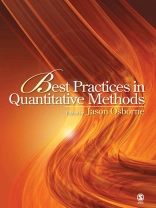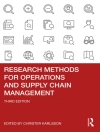The contributors to
Best Practices in Quantitative Methods envision quantitative methods in the 21st century, identify the best practices, and, where possible, demonstrate the superiority of their recommendations empirically. Editor
Jason W. Osborne designed this book with the goal of providing readers with the most effective, evidence-based, modern quantitative methods and quantitative data analysis across the social and behavioral sciences.
The text is divided into five main sections covering select best practices in Measurement, Research Design, Basics of Data Analysis, Quantitative Methods, and Advanced Quantitative Methods. Each chapter contains a current and expansive review of the literature, a case for best practices in terms of method, outcomes, inferences, etc., and broad-ranging examples along with any empirical evidence to show why certain techniques are better.
Key Features:- Describes important implicit knowledge to readers: The chapters in this volume explain the important details of seemingly mundane aspects of quantitative research, making them accessible to readers and demonstrating why it is important to pay attention to these details.
- Compares and contrasts analytic techniques: The book examines instances where there are multiple options for doing things, and make recommendations as to what is the ‘best’ choice—or choices, as what is best often depends on the circumstances.
- Offers new procedures to update and explicate traditional techniques: The featured scholars present and explain new options for data analysis, discussing the advantages and disadvantages of the new procedures in depth, describing how to perform them, and demonstrating their use.
Intended Audience: Representing the vanguard of research methods for the 21st century, this book is an invaluable resource for graduate students and researchers who want a comprehensive, authoritative resource for practical and sound advice from leading experts in quantitative methods.
Table des matières
Introduction – Jason W. Osborne
Chapter 1: The New Stats: Attitudes for the Twenty-First Century – Cherdsak Iramaneerat, Everett V. Smith, Jr., & Richard M. Smith
Part I: Best Practices in Measurement
Part I: Best Practices in Measurement – Jason Osborne
Chapter 2: Using Criterion-Referenced Assessments for Setting Standards and Making Decisions: Some Conceptual & Technical Issues – Thomas Kellow & Victor Willson
Chapter 3: Estimating Inter-Rater Reliability: Assumptions and Implications of Three Common Approaches – Gianluca Baio & Marta Blangiardo
Chapter 4: An Introduction to Rasch Measurement – Jason W. Osborne
Chapter 5: Applications of the Multi-Faceted Rasch Model – Peter R. Killeen
Chapter 6: Best Practices in Exploratory Factor Analysis – Jason W. Osborne
Part II: Selected Best Practices in Research Design
Chapter 7: Replication Statistics – Jason W. Osborne
Chapter 8: Mixed Methods Research in the Social Sciences – Wolfgang Viechtbauer
Chapter 9: Designing a Rigorous Small Sample Study – Bruce Thompson
Chapter 11: Best Practices in Quasi-Experimental Designs: Matching Methods for Causal Inference – Elizabeth A. Stuart & Donald B. Rubin
Chapter 12: An Introduction to Meta-Analysis – Ken Kelley, Keke Lai, & Po-Ju Wu
Chapter 12: Fixed and Mixed Effects Models in Meta-Analysis – Spyros Konstantopoulos
Part III: Best Practices in Data Cleaning and the Basics of Data Analysis
Chapter 14: Best Practices in Data Cleaning: How Outliers and ‘Fringeliers’ Can Increase Error Rates and Decrease the Quality and Precision of Your Results – Edward W. Wolfe & Lidia Dobria
Chapter 15: How to Deal with Missing Data: Conceptual Overview and Details for Implementing Two Modern Methods – Naomi Jeffery Petersen
Chapter 16: Using Criterion-Referenced Assessments for Setting Standards and Making Decisions: Some Conceptual and Technical Issues – Jason C. Cole
Chapter 17: Computing and Interpreting Effect Sizes, Confidence Intervals, and Confidence Intervals for Effect Sizes – Elizabeth A. Stuart & Donald B. Rubin
Chapter 18: Robust Methods for Detecting and Describing Associations – Jason W. Osborne
Part IV: Best Practices of Quantitative Methods
Chapter 19: Resampling: A Conceptual and Procedural Introduction – Jason W. Osborne
Chapter 21: Advanced Topics in Power Analysis – Rand R. Wilcox
Chapter 21: Best Practices in Analyzing Count Data: Poisson Regression – Jason W. Osborne & Amy Overbay
Chapter 22: Testing the Assumptions of Analysis of Variance – Chong Ho Yu
Chapter 23: Best Practices in the Analysis of Variance – Jason W. Osborne
Chapter 24: Binary Logistic Regression – E. Michael Nussbaum, Sherif Elsadat, & Ahmed H. Khago
Chapter 26: Multinomial Logistic Regression – Yanyan Sheng
Chapter 27: Mediation, Moderation, and the Study of Individual Differences – David Howell
Chapter 28: Mediation, Moderation, and the Study of Individual Differences – A. Alexander Beaujean
Part V: Best Advanced Practices in Quantitative Methods
Chapter 30: Hierarchical Linear Modeling: What It is and When Researchers Should Use It – Carolyn J. Anderson & Leslie Rutkowski
Chapter 30: Best Practices in Analysis of Longitudinal Data: A Multilevel Approach – Cody S. Ding
Chapter 32: Best Practices in Structural Equation Modeling – Jason W. Osborne
Chapter 33: Introduction to Bayesian Modeling for the Social Sciences – Jason W. Osborne
Chapter 35: Measuring Accuracy in Psychological Research – Frans E.S. Tan
Chapter 37: Ethical Implications for Best Practices in Quantitative Methods – Ralph O. Mueller & Gregory R. Hancock
(Dropped) Chapter 4: Best Practices in Graphically Displaying Data – Jason W. Osborne, Anna B. Costello, & J. Thomas Kellow
(Dropped) Chapter 7: Choosing a Demoninator – Jessica T. De Cuir-Gunby
(Dropped) Chapter 9: Four Assumptions of Multiple Regression You Should ALWAYS Check – William D. Schafer
(Dropped) Chapter 28: An Introduction to Item Response Theory – Jason E. King
(Dropped) A Framework for Model Building in Social Science Research – Steve Stemler
A propos de l’auteur
Jason W. Osborne is a thought leader and professor in higher education. His background in educational psychology, statistics and quantitative methods, along with that gleaned from high-level positions within Academia gives a unique perspective on the real-world data factors. In 2015, he was appointed Associate Provost and Dean of the Graduate School at Clemson University in Clemson, South Carolina. As well as Associate Provost, at Clemson University, Jason was a Professor of applied statistics at the School of Mathematical Sciences, with a secondary appointment in Public Health Science. In 2019, he took on the role of Provost and Executive VP for Academic Affairs at Miami University. As Provost, Jason implemented a transformative strategic plan to reposition the institution as one prepared for new challenges with a modern, compelling curriculum, a welcoming environment, and enhanced support for student faculty positions and staff. In 2021, he was named by Stanford University as one of the top 2% researchers in the world, underlining his commitment to world-class research methods across particular domains, ultimately influencing a generation of learners. Currently, Jason teaches and publishes on data analysis ‘best practices’ in quantitative and applied research methods. He has served as evaluator or consultant on research projects and in public education (K-12), instructional technology, health care, medicine and business. He served as founding editor of Frontiers in Quantitative Psychology and Measurement and has been on the editorial boards of several other journals (such as Practical Assessment, Research, and Evaluation). Jason W Osborne also publishes on identification with academics and on issues related to social justice and diversity. He has written seven books covering topics to communicate logistic regression and linear modeling, exploratory factor analysis, best practices and modern research methods, data cleaning, and numerous other topics.












